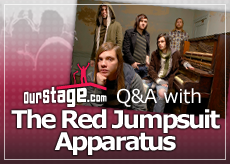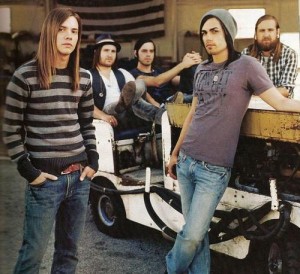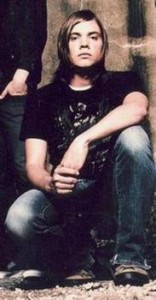Q&A With The Red Jumpsuit Apparatus
posted in: Exclusive Interviews • Features • Rock
 The Red Jumpsuit Apparatus‘ anti-abuse single “Face Down” essentially launched the Florida natives’ career back in 2003, earning them a slot on the Take Action Tour as it helped their fans deal with depression. But since then, things have been a little tough”the band left Virgin after just two records, and are independently releasing their upcoming album I Am the Enemy. We got a chance to catch up with Red Jumpsuit Apparatus frontman Ronnie Winter to talk about the impact of “Face Down,” the band’s genre-jumping abilities and how their split from Virgin just might be the best thing that could have happened to them.
The Red Jumpsuit Apparatus‘ anti-abuse single “Face Down” essentially launched the Florida natives’ career back in 2003, earning them a slot on the Take Action Tour as it helped their fans deal with depression. But since then, things have been a little tough”the band left Virgin after just two records, and are independently releasing their upcoming album I Am the Enemy. We got a chance to catch up with Red Jumpsuit Apparatus frontman Ronnie Winter to talk about the impact of “Face Down,” the band’s genre-jumping abilities and how their split from Virgin just might be the best thing that could have happened to them.
OS: The Red Jumpsuit Apparatus was really popular in your home state long before you blew up everywhere else”what was it like to grow as a band in that Florida scene?
RW: It was pretty awesome. There’s quite a few bands, actually, from our local area. So just growing up there was a lot of really good music to look up to that came from our local town. I feel like that had a lot to do with it. Red Night Scare is basically from our hometown, so is .38 Special. Also Yellowcard is basically from the same hometown that we are. So a lot of bands have become successful from the area. When we were in high school we really felt if you do good enough, you have a shot. I think that’s cool. Lots of kids kind of get that idea in their head, that if it’s not you it’s somebody else, you know what I mean? Then we just started writing songs… And I don’t know, eventually we just decided to play a show, and it was one of those things where literally right after the first show we just had a lot of really great responses. Everybody wanted the CD, and we hadn’t made one yet. We didn’t even have tee shirts, everybody was asking for tee shirts. We had other bands who were there that had CDs and shirts and nobody wanted them, and we didn’t have CDs or shirts and everybody wanted them. So we were like, Okay, well maybe we’ll put our other bands on the back burner, we’ll focus on this thing for a while. And literally less than a year later we’re selling out big venues and selling a lot of CDs on our own… we made enough money to quit our jobs and live off the band almost a year and a half before we even tried to get signed, so that was really cool.
 OS: A lot of that early success was thanks to your first single Face Down, which was a very personal, vivid description of abuse. How did it feel to hear that all over the radio?
OS: A lot of that early success was thanks to your first single Face Down, which was a very personal, vivid description of abuse. How did it feel to hear that all over the radio?
RW: It was definitely weird, especially, you know, when my Mom and Dad heard it. [Laughs] That was weirder. But I don’t know. When you write a song, you don’t think about what this is going to sound like on the radio, you know? You just write what you’re thinking, and on that particular day, that’s what I was thinking about. I wrote it, I showed it to Duke and the rest of the guys in the band, and I was like, You know, I feel like this is a pretty good song, what do you guys think? It wasn’t really that big of a deal to us at the time, we were just writing a lot of honest songs like that. There’s another song called Getting By, which is almost to the same beat that I wrote Face Down in, talking about basically after you graduate high school, realizing how shitty the world really is. Everyone goes through a little bit of a depression phase, I think. Either you shoot into college, you get straight A’s, full scholarship or someone helps you out with money, or you’re working full time, so that’s hard to get by. It’s the same kind of scenario. We were just writing from the heart. It was a little interesting to hear it on the radio, but it definitely is a true story, so I’m glad people were able to relate to it. I have thousands, literally thousands, tens of thousands of emails of people thanking me for writing the song, saying that helped them get through a difficult time. That wasn’t the intention, the intention was just to describe what I was feeling, but something positive came out of it.
OS: After that single, you guys did a lot of positive stuff”you joined the National Coalition Against Domestic Violence and participated in the Take Action Tour. Do you feel like there’s pressure there because of that”that there are certain themes you have to cover?
RW: Well, not really, because most of the stuff that we’ve done has always been really fan-driven. You mentioned NCADV”they actually approached us and said that they’d had some kids calling in and saying that the song made them want to call in and talk about their problems and change their lives. So they reached out to us and just said, Hey, we really like your song ˜Face Down,’ would you be willing to do something with us? And we were like, Yeah, that sounds awesome. So they actually initiated, you know what I mean? That’s not us. We didn’t like, decide to go grab them. Same thing with the Take Action Tour. As I said earlier, we have a lot of songs that deal with depression and teen suicide because we believe that’s a topic that needs to be talked about. Teen suicide is still happening all over the place, and people talk about it like it’s not a big deal, but it is. It is to us. And we believe that a lot of the time, you can save a life if you just talk to somebody. The Take Action Tour knew that that was kind of our vibe, they addressed us and asked us if we wanted to do the tour even though it’s a charity tour. There’s not really any pressure because a lot of times there’s not anything to be pressured about. People just come to us and ask us to do stuff, and if we think it’s cool and a cool vibe, then we do it.
 OS: Speaking of tours, you’ve been with everyone from poppy acts like Amber Pacific to hard rock bands like Shinedown to the current tour with hardcore band Yashin. Why do you think you’ve been able to mesh well with so many different types of bands and fans?
OS: Speaking of tours, you’ve been with everyone from poppy acts like Amber Pacific to hard rock bands like Shinedown to the current tour with hardcore band Yashin. Why do you think you’ve been able to mesh well with so many different types of bands and fans?
RW: We actually have a lot of really different sounding songs. We definitely don’t try to stick to one genre with our music. Both of our first two records, if you put one song next to the other a lot of people say they don’t even believe that it’s the same band… Everybody in my band has completely different taste in music, which is cool. We all sort of bring that into the mix when we write. Some of our guys are really big into hip hop, some of the guys are really into country, I’m mainly into post-hardcore and punk rock, and some of our guys are straight up alternative and old-school rock. I think that helps, the fact that we have enough different style songs that we can mold our set list to whatever band we’re playing with to where it sounds cohesive. Or not! Sometimes we’ll do the opposite, and we’ll want to stand out. If we’re playing with a bunch of hardcore bands, we’ll play a really poppy set so we totally stand out and don’t sound anything like anybody else. One time we played with Fergie at an arena in New York, and we played every song that we have that was all screaming and barely any singing. So we stood out in that scenario. I don’t know, it’s just kind of fun. We do what we want I guess. We’ll find a way to make it work.
OS: You guys went through some tough times after Lonely Road was released, and you ended up firing your manager, Steve Tramposch. Do you think having a manager was important or did you do okay on your own?
RW: Now we have a management company called the Collective. The thing is, we had a guy who was just one guy in his office. When everything started, it really wasn’t that much work. He could totally handle it, and he was a good manager for sure. He worked 24/7 for us, and that’s what we needed. That’s what we always wanted was to pay somebody money to open doors for you. It’s that simple. It’s nothing personal, it’s business… After we had a couple records out, when the workload got to the point to where it’s more than what one person could actually handle, he just wasn’t able to keep up, and we had some conversations, and we parted ways. It’s that simple. We partnered with Collective, which is actually a management firm, so instead of one guy we have an entire team of people behind us. Everybody’s got their own job, nobody gets overworked, and your band is taken care of 100% of the time. I think we just grew as a band out of that situation and into where we are now. Nothing personal, it just is what it is. It wasn’t a lot of drama or anything… we were with him a long time, and we parted ways, and that was that.
OS: In the video for “Choke“, you guys are killing what look to be some record label execs. Was that inspired by your split from Virgin?
RW: [Laughs] I get a lot of questions about that video. The first thing I want to say is it’s actually part one of a three-part series. A lot of people don’t know that, and we did our best to try to explain that, but a lot of kids will throw up one video on YouTube”once they see it, they’ll throw it back up. It’s impossible to embed in their YouTube stream, Hey, this is part one of three. But if you go to our page, it explains that in detail. The actual story is a string of characters who are just basically criminals… They go into this place and they kill a bunch of people. In the second video, they go to a little hideout. They’re drinking booze, they’re smoking cigarettes, they’ve got money on the table. Basically it’s a robbery, but you never see the robbery scene. And then in the third scene, it’s them being chased down by the cops and there being like a showdown at the end. We all get shot because we won’t turn ourselves in, we fight the cops. When you look at it from that perspective, it’s just a story like any other video. We wanted to stretch it out and make it three parts because we thought it would be cool. We’d never had an opportunity to do that with Virgin. So we’re like, Hey, now that we’re independent we can do whatever we want. Let’s do one long story in three songs. If you look at the video in context, it’s clearly not about a record label. But if you just watch that one video, for sure, it obviously looks like it, because we actually shot it in our management firm’s office. So you can see, like, gold records on the walls and stuff. And we thought that would be fine, because we thought that some people would pick up on that. But obviously, who cares? It’s rubber guns, you know what I mean? And yeah, it was a little bit of a message to Virgin. But the real message was, We can do whatever we want now. Not, We’re gonna come kill you. Anybody who thought that is basically just out of their mind. It’s stupid. First of all, if you’re gonna kill somebody, don’t make a video of you killing them first and then send it to them. That’s pretty dumb. Basically it was just showing them that we don’t have any kind of restrictions as far as graphic or artistic”we can literally do whatever we imagine now.
OS: So it’s been a positive thing, the split from Virgin?
RW: Absolutely. 100%. You can believe it or not”we’re not going to put a bunch of our personal files online”but in the beginning there was a lot of people who were like, Oh, Red Jumpsuit got dropped. And a lot of bands say that they didn’t, but we 100% didn’t. It’s very simple. We actually signed a deal with them that was three solid, two optional. That was the deal. So what that means is we absolutely had to make three records for them, and then if they still wanted to make records with us, then we had to make another two for them. But we only made two for them, because when the third record came around, basically they couldn’t honor their contract. They sent us a new contract with all these weird, additional things in the contract, like Okay, we can’t honor the contract because we didn’t sign the musician. I’m a new guy, and we don’t have the budget we had back when we signed you, and everything’s changed, and blah blah blah. And we were like, Guess what? We don’t give a shit. We had a contract. You’ve been doing this to us for four years, saying, ˜Follow the contract, follow the contract, follow the contract.’ And now that the contract’s in our favor, you don’t want us to follow the contract? I don’t think so. Follow the contract. Take your own advice. They didn’t want to do that, so there was an option in our contract that said if they didn’t follow their contract, we could get out. So we got out. Bam. It’s pretty rad, actually. Doesn’t usually happen that way. It’s pretty rare.
Check out the Red Jumpsuit Apparatus on tour with Yashin, and give their new single “Reap” a listen below!
